 What can I say, it’s the RZA son!
What can I say, it’s the RZA son!
I’ve rarely had the opportunity to speak face-to-face with someone quite as dynamic, intelligent, and fun as the RZA, and so even in a round table scenario this is one of the interviews I’ve most enjoyed being a part of. I think you’ll find the rapper-turned-director-turned-composer has some interesting things to say, and I especially appreciate his insight into taking on a huge role in a new field, when he’s already grown so successful and comfortable in another.
The Man With The Iron Fists is still out there in theaters, while it aims for rollout across the world over the next few months. My own traveling (and the tight lid they kept on it pre-release) has prevented me from seeing the film before this weekend , but I expect this is one that will find a nice warm spot on the shelves of Kung-Fu enthusiasts. I definitely look forward to seeing what comes of the RZA as a director- he’s not a one-and-done kind of guy…
In any event, this interview goes deep, and runs pretty long. This is definitely a good one for big fans of the RZA, Wu-Tang, or Kung Fu to any degree.
——————
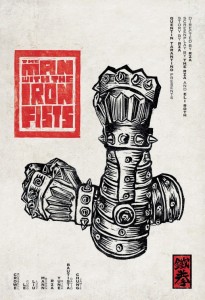 Renn: I guess I’ll start off by asking: being that you’re a tried and true veteran of one industry and you’ve tested and proven yourself every way possible as a musician, what is like moving from that place in a career to somewhere else where you’re out of your comfort zone to some degree?
Renn: I guess I’ll start off by asking: being that you’re a tried and true veteran of one industry and you’ve tested and proven yourself every way possible as a musician, what is like moving from that place in a career to somewhere else where you’re out of your comfort zone to some degree?
RZA: No, this process was a nerve-wrecking process. You know what I mean? What I did to help me conquer it was I stayed sober. You know, music, I could smoke week in the studio all night and let the energy flow.
Renn: Right…
RZA: But with this, man, with that much money under my control, that many people, the kind of talent – you know, A-class talent – in my hands, I had to be super focused. It was very nerve wrecking and challenging, but I was prepared for the challenge and I was not going to let myself not rise to the occasion. And I rose to the occasion, and I know I did when I saw my actors trust me on ideas that weren’t on the paper sometimes. And, at the same time, they knew that they were in the hands of a good director who is an artist first. I mean I understand how it is to be in front of the camera and you may have to fucking fart, but you know what you got to do. You know what I mean? So they understood that, and so, when they had ideas that weren’t on the paper, I was an ear for that as well.
Renn 1: Was that instantaneous on set or did that take some work to get to that place with them?
RZA: I think on set it was instantaneous because before we started shooting, I’d talked and prepped and prepared with everybody over and over. You know, I don’t care if I had this — you know, Lucy came in later on in the filming as well as Russell a little closer to ten weeks. But the first five weeks was without them. But during those five weeks, I would email: “Hey bro, we shot this today. Hey, I’m thinking. What do you think about this for the character.” You know? So, it was a lot of dialogue. My hours were eighteen hours a day. You know what I mean? And the only time I really had to myself was during the prep weeks – the fourteen weeks of prepping. Those days were maybe ten-hour days. So, that was all right, but when we started filming, it was eighteen-hour days.
Q: You worked with some great directors in the past. Jim Jarmusch, Ridley Scott, and Quentin Tarantino of course. Tell us about how sort of working with those guys helped prepare you for this experience and what did you learn. Like are there specific things that you can think of that you learned from each one of those guys?
RZA: First, I just want to say that Quentin Tarantino is my mentor and my teacher. So, if I was to belong to a Kung-Fu School, I belong to the School of Tarantino. But throughout the course though I did meet Jim Jarmusch first and Jim gave me a lot of time and a lot of wisdom that I absorbed. What Jim does for me is he’s able to capture an image in his movie and he’ll stay on the image. He’ll stay on that character. But he’ll stay on is so long that sometimes your mind drifts. You know what I’m saying? Which is cool because you could be watching with that guy and you’ll start thinking about what he’s thinking about. That’s the tactic.
Quentin actually, if he gives you a long status shot, his dialogue is so potent that he makes your imagination follow the dialogue. If you look at something like Reservoir Dogs, you never see the heist. But in your mind you feel like you’ve seen the entire heist because of how these guys talk about it. You know what I mean? If you look at Ridley Scott, when I was working with him, that’s when I had seen multi-vision. Here’s a guy that can setup nine cameras and know what each camera got. I mean Russell told me a story about him on Gladiator that blew my mind because I saw what he did on American Gangster. And I told Russell. I said, “Yo, this guy has like a multi-vision going on.” I call it that word. Multi-vision. He’s like, “Robbie, listen, on Gladiator, he would do shit like he’d call action, and he set all the cameras up, and then it didn’t go right. So, he’d go back, ‘No no. When this horse passes this particular river, you jump up. And when the leaves fall on here, that’s when you pull your horse.’ And he said eighteen different things that nobody else understands because it’s his mind, but if this guy doesn’t get that horse there in time, he’s messing up what he wanted that camera to catch and this camera to catch.
And when we were doing Gangster, there was a scene where one of the actors – you know, it was just a dialogue scene – wasn’t on him as far as the camera you could feel. You know, some actors can feel cameras, but Ridley got cameras where you don’t feel them. And this actor didn’t feel the camera. It wasn’t on him. It was on Me and Russell maybe. He was just kind of like, you know, waiting for his fucking close-up or whatever, right? Shit. When they cut the scene, Russel walked up and told him: “Hey, where were you? Where were you? No. No. The way Ridely shoots, your part in this fucking take could’ve been right there.’ And he was right. You know what I’m saying? Because the first time the guy ate the donut, but the second time he’s just sitting there. “Boy, no, no. Eat that. Bite that fucker every time.” You know what I mean? Anyway. So, there are just different things I learned from those men.
But with Quentin I just had years of watching films with him. Sitting beside him. You know what I mean? In his home theater. Traveling around the world at film festivals. Absorbing the talking. I got a chance to spend nights at his house and check out his library, and things like that. So, that’s my school.
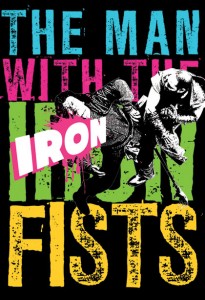 Q: What are a couple of the movies that you especially remember watching with Quentin and have a dialogue about. That would be kind of a cool thing to include.
Q: What are a couple of the movies that you especially remember watching with Quentin and have a dialogue about. That would be kind of a cool thing to include.
RZA: Yeah, so many movies, man, that I blank out because there’s so many.
Q: Yeah, of course, I understand. We can come back to it.
RZA: Yeah. So many movies, man. I mean I’ll talk about movies from Linda Blair is the star, which is horror, to movies where George Segal was the biggest star in the world.
Q: Yeah.
RZA: You know what I mean? To movie where Kris Kristofferson was the biggest star of the movies. Like I would’ve never watch Capricorn One. That’s OJ and those four guys, but that movie actually has a certain sequence in it that’s incredible. There’s one movie we watched on VHS, which I never would’ve watched. I remember the commercial as kid. Fast Break. Now, why are we watching it? Why am I watching Fast Break? Okay? But yet, from watching that movie, I still learned a bit or morsel of filmmaking and of acting. So, you know, tell him what he’s going to put in; what’s the triple feature going to be that night. You know what I mean? A Minute to Pray, A Second to Die. You know what I mean? They watch that, you know? So you never tell them what it’s going to be, you know? One thing. Some of the prints that he had of all these old movies, some of the prints, the colors were burnt. Like let’s say it’s all pink, or it’s all blue, and all that. But something about the way it looked inspired me to actually shoot scenes like that. I want the scene to look this way. You’ll notice, in my films, the colors are a certain way. You know, Tony Scott, to me, always has a few bits of green in his movies. You ever notice that? Anybody notice that? Okay. So, I had to choose a color, and I like the color – a hue pinch of purple. Just squeeze a little bit of purple in that mother fucker. You know what I mean? Anyways.
Q: I have two things to kind of bank off of that. One, hearing you talk about kind of the grain of the Kung-Fu films immediately makes me think of your style as a producer and the sound that you gave Tical and Ironman, and Cuban Linx. Is that something you’ve ever seriously thought about
RZA: What? The styles of what I gave to those albums?
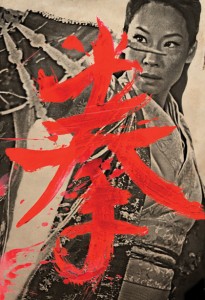 Q: The relation to the style of those albums with a sound to the look of those films.
Q: The relation to the style of those albums with a sound to the look of those films.
RZA: Yeah, I mean I was, and am, so engulfed in martial art film catalogues. I mean I watch martial art films continuously. I still watch it. Even if I’ve seen it twenty times, we watch it. Me and my little brothers. This is what we watch and study. You know what I mean? And that stuff influenced my music, influenced the sound of them, but I also like mafia films. That’s why we got the Cuban Linx. Even though Cuban Linx is a mafia crime story, but I use a Chow Yun-Fat and John Wu movie to tell the mafia story that’s basically Once Upon A Time In America. You know what I mean? Of three guys. It starts off – “one’s for me and two for you. Yo, noodles!” I mean that’s Once Upon A Time In America, but we took the Asian and we mixed the Asian with the Italian. Listen to Liquid Swords, where GZA is kind of going more esoteric with his lyrics and everything, but yet, I went Asian, but I didn’t go Chinese Kung-Fu. I went Japanese samurai. You know what I mean? On Tical, it starts off with a channel 5 Saturday morning cue. That’s the picture on that mold, but he goes PLO style. More military and more women and children with his music. You know what I mean?
Q: Right.
RZA: So, those are the elements I use. And for Man with the Iron Fist, it’s the same thing. I combined a lot of elements from — of course, martial arts is the key element, but no, I love Star Wars. I love comic books. I love fantasy movies. At the same time, I’m a history buff. There’s the Bessemer in this movie. And what is a Bessemer? A Bessemer was used by USA still when they finally got the temperatures of a furnace to reach up to eighteen hundred, even some up to twenty-two hundred, degrees to melt the iron and reforge the steel stronger and stronger. Now, the Bessemer didn’t exist till about 1870. Maybe ’79. Yet, this film was taking place forty or fifty years earlier, and the Bessemer is usually the size of — you know, it’s a giant. It’s looks like it’s from Mars. I think it is. But this guy has a room-sized one. You know what I mean? Because I was like: “Let me us this Bessemer to show you the tenth of what I mean by what kind of metal he’s using to make the weapon.” Now, of course, the only people that are going to get it are the people who understand that, but, as you watch this film, you’re going to find many layers. I put extra little things in it. Just extra little tricks in it.
You know, you look at Jack Knife’ knife. To me, the coolest knife I saw as a kid was Rambo’s. I had to make one cooler. So, I’m just saying these are the types of things, as a film buff, you wind up — the film becomes your encyclopedia. It becomes your study. We’re making film. A lot of people say, you know, “be original.” Every film is inspired by somebody else. If you go back to the first films, whether they were doing Shakespeare plays, or stories, or Mark Twain, or whatever, it’s always an inspiration for something else that causes us to create something else.
Let me just add this last thing because there’s a movie I watched while I was making the film. It’s called Flash of Genius, and it had the same producer I had – Marc Abraham with Greg Kinnear as the lead actor. And I watched this movie on Sunday. And he did a scene in the movie, where he’s being charged by the Ford Motor Company. You know, he’s suing the Ford Motor Company because he made the windshield wiper and they’re saying they made it, and he’s trying to sue and win. And they said, “Ford makes cars and you didn’t make it. They make this stuff. How do you think you created something?” He said, “No, I took what existed and made the wipers.” They said, “What do you mean?” He said, “Okay.” He went to a book. He started reading out the book. He went to the book [grabs a nearby book and starts reading a random page] and he was like: “Measurement. Estimation. Calculation. Comparison. Victory. The five steps.” All right. Those words have been around forever, but these are now giving you five steps. It’s being used. The former book. He said, “He didn’t make the words. Mark Twain didn’t make the words. But when he put it together and made Huckleberry Finn, it became his own original thing.”
That’s what filmmakers, to me, do when we understand our craft. And I learned that from Quentin by watching him, you know, do this; and the funny thing is that’s what I did in music. I didn’t have instruments. I had a sampler. That was my instrument. So, I had to go and take a snare from James Brown, a kick from Isaac Hayes, a horn hit from Mad Lads. You know what I mean? A piano from Bill Evans maybe. You know what I mean? And a note from this and a note from that. And put all that together to make my sound. You know what I mean? And it doesn’t sound like damn Bill Evans – a man who I love. One of the greatest Jazz players. Thelonious Monk as well. But it doesn’t sound like theirs when I get through with it.
Q: The second part was I wanted to ask you about The Art of War specifically and maybe how, in a grander, 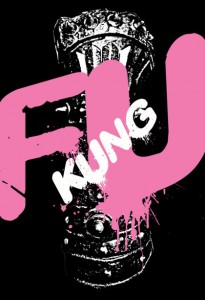 philosophical sense, it still effects you as you move from being a musician to scoring films and actually writing screenplays.
philosophical sense, it still effects you as you move from being a musician to scoring films and actually writing screenplays.
RZA: Well, I only got three books with me on this particular road, and The Art of War is one. It’s the book I read out of yesterday.
Q: I read it every day too.
RZA: Yeah, exactly.
I mean I went back yesterday to the first chapter for strategic assessment; is because I seen my tour bus. Some of the guys weren’t as focused as I wanted them to be. They come out here and they’re trying to be about themselves, but you know, they’re rappers. They want girls on their dick. I said, “Wait a minute, we’re here for Iron Fists, kid. I don’t care about you right now. I brought you to talk about me. Not even me. It isn’t about me. It’s about the Man with the Iron Fist.” So, The Art Of War is a very important book. A very healthy book for his business, whether it’s personal living. You know what I mean? And even as a film director. The funny thing is this. A true story. This is sad and short, but it’s real. So, before I started filming, I had about four hundred people that had to go to work for me. Seventeen department heads. We bring in the seventeen department heads and some of their key people. So, now it’s in a room of about sixty, maybe eighty, people, but let’s say between sixty and eight people. And we’re all in a big room and we’re about to start shooting tomorrow morning; and the director has to make this speech. And I get up in front of everybody. I have my translator right there. Some understand English; maybe a dozen understand English, but most don’t. I said, “Okay, we’re about to go on a mission together. We’ve been preparing for fourteen weeks and what I want to do is refer you all to the great Sun Tzu and his book The Art Of War. And we’ll use this book to show the guidelines of where we’re at now and where we need to go. How many of you are familiar with The Art of War?” And it’s a room full of Asian brothers, and guess how many of them was familiar with it?
Q: All of them?
RZA: None!
Q: Crazy.
RZA: It bugged me the fuck out!
Q: It’s probably by design.
RZA: Yeah, because they had the cultural — he explained it to me. No, I had to inquire about that the next day. I didn’t know what the fuck was going on. I was like: “I know you all don’t have no beef lo mien in this mother fucker. I understand that. We made that name up for you all. But Sun Tzu was a real man. This is the man right here. But the Cultural Revolution – they did away with a lot of it then. You know what I mean? But anyway, they didn’t understand what it was, but I still used the book. I said, “Well, anyway, what it says is we must assess and we must face our terrain. We must know our terrain. Our terrain was our location.” And I just went on using all the things to relate to what we were doing, and they loved it; and maybe they got the book after that. But to think that you are in China and, out of so many people, I caught like one person raising his hand, like: “I know this.” Anyway.
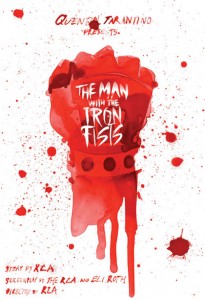 Q: I have a quick question. Why Kung-Fu? Why Asian culture? What is it that connects to you about that?
Q: I have a quick question. Why Kung-Fu? Why Asian culture? What is it that connects to you about that?
RZA: Well, Kung-Fu is really Asian culture. They preserved it. My sifu –who is a Shaolin monk– he actually explained to me that actually, Shaolin preserve the Kung-Fu from all around the world. He said, “Many people came from around the world to this location, and they preserved all the books. All the book didn’t originate with them. Even Bodhidharma, who is credited for martial arts – he gets most of the credit. He comes from South India. You know what I mean? So he wasn’t Chinese. To me, you know, growing up in the ghetto at my age, I just needed escapism, and these films offered it to me. And they offered me something that I just became passionate about. I mean, at one point, you know, I just was infatuated by Asian women! You know what I mean?
Q: That’s what I waiting to hear.
RZA: That was my, you know?
Q: So, Lucy Lu was like —
RZA: Oh, Lucy. I wrote a song about Lucy Lu.
Q: Yeah.
RZA: I mean that’s flattery of flattery.
Q: I kind of want to write a song about Lucy Lu.
RZA: See, exactly. I definitely was flattered and in love with him; and still am. But, at the same time, the culture shows me this; that I wasn’t getting from normal American films: brotherhood, loyalty, and sacrifice. I mean, by sacrifice, you watch a movie like Executions From Shaolin. Anybody seen that one? Okay. Executions From Shaolin. There’s a scene where Hsi-Kuan is running, and the Government is after him, and he bumps into another guy who is just: “Hsi-Kuan. Brother Kuan.” And they’re there, and the Government comes. They just met each other. And they come and they come with their arrows. They try to attack Hsi-Kuan and this dude jumps in front of their arrows. You know what I mean? Then goes and fights off the Government while Hsi-Kuan gets to run. That’s sacrifice. You know, those types of things. Brotherhood, where, you know–
Q: Loyalty.
RZA: Loyalty. Those things were powerful in the films and it resonated with me.
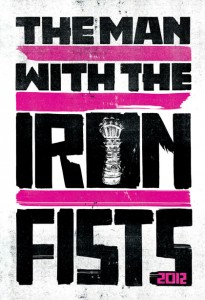 Q: Just one more question I’ve got. When was your first instance of discovering that culture? Like how did that get introduced to you?
Q: Just one more question I’ve got. When was your first instance of discovering that culture? Like how did that get introduced to you?
RZA: It was a double feature move at the St. George Theater on Staten Island. My aunt took me to the movies. It was a Bruce Lee film and a Jim Kelly film. It was my first time seeing that kind of action. This was probably my fifth time ever in the movie theater. You know what I mean? Yeah, because I went to the movies. I’ll just give you a little history. The first movie I ever saw was Huckleberry Finn. That was the first movie I ever saw – Huckleberry Finn. The second movie I saw was Star Wars. See, and then The Swarm, which was a double feature. And then, after that, I didn’t see any movies until I saw Fury of the Dragon, which is basically Bruce Lee as Kato in Green Hornet. So, it wasn’t a real movie. I learned later they just edited it together. And Black Samurai with Jim Kelly. If you look at my career a little bit, the killa bees is on the swarm. Okay? I’m always talking about this force and, you know, spirituality, which we get from Star Wars. You know what I mean? Kung Fu; Bruce Lee is all in my stuff, and here is a black guy in a Kung Fu movie, Jim Kelly.
Q: Right. Right.
RZA: The first five movies really helped develop me.
Renn: The DNA is all right there,
RZA: DNA was there. And this all happened maybe from the age of eight to nine. I became addicted to the Kung-Fu movies and I would go every weekend.
Q: It’s interesting because usually, in American media, Asian men are emasculated, but like when you actually watch an Asian film it’s the complete opposite. Like you said, it’s really like uplifting what it is to be a man and all that.
RZA: Yeah, very uplifting. You know, you said that — that’s something I don’t notice because I watch a lot of Asian films in America. So, I didn’t recognize, because one of the actors pointed it out me, that some of the Asian brothers don’t get their full shine. Right? But I said, “Well, bro, you got your shine in this movie, bro.” His shirt is off. He’s ripped. You know, he’s a model. You know what I mean? He’s like bung-boom. Eli had a joke for him on the set. Eli was calling him: “Rip-Yune is here. Rip Yune is here.” Eli was like — that’s a funny guy, man.
Q: I’m curious about the scoring of the film because I read you weren’t originally going to do it, right?
RZA: Yeah, I wasn’t.
Q: And I just didn’t know. Is it like what aspects of hip-hop?
RZA: Yeah, I was not going to do the score. The studio asked me to do it. I tried to get out of it, but Quentin doubled down on it. So I did it, but what I had in the beginning when I was first writing the film, I wrote it to music. And had some of the Stax music. You know, Isaac Hayes, Otis Redding, Mad Lads, and William Bell. Those types of songs. I would write to these songs. I also had a lot of classical music. I had a whole playlist for Iron Fist. I was hoping that we could even buy some of these songs and stuff like that, but I always had a vision, which I told my music supervisor early on. I said, “You’re going to hire a composer, but I want to make sure we get the rights to some of these Stax masters because I would love to take them, strip them down, and re-orchestrate them.” And he was like: “Whoa, that’s a great idea. That hasn’t been done.” I said, “Yeah, I know.” I said, “That’s why I wanted to do it.”
But he was actually able to go and we got about five masters from the Stax collection that we were able to change around and re-orchestrate. So, that’s some of the music – sound of the music. You know what I mean? Of course, I infused hip-hop. I got some of the Wu Tang songs and I was able to re-orchestrate some of those thins. Some of the beats you’ll hear will come in a different way. And then, normal — I love classical, and so me and my buddy, Howard Drossin, spent about eight months writing music for this thing. And you’ll hear influences, of course, from BIll Conti – one of the greatest. You know what I mean? Hans Zimmer is still a modern great. You know what I mean?
Q: Right.
RZA: You know? And some people talk a little crap about this guy who I think is great as well. One of my favorites – Danny Elfman. When he does the Spiderman movies, it works baby. You know, we had a scene in the movie that needed some quirkiness for one of the characters named Chan, played by MC Jay. And he’s like: “Okay, let’s go traditional Hollywood. Let’s make it simple.” You know what I mean? Not simple, but you know, Hollywood flavor. So, it’s a combination of all these different things. And it really works in the film because you’ll be watching this film and you’ll find yourself tapping your feet, you know? You know what I mean? Which I think is a good thing in a movie. To me a movie should be fun, first and foremost. I learned a lot from watching movies like The Godfather, or watching movies on documentaries from where I live, whether it’s Invictus with Morgan Freeman, you know, love stories. But I think the most important thing you should get from a movie theater experience is fun. You’re paying. There’s popcorn. There’s candy. Fun. And this movie is fun. And I’m not saying that to sell it to you guys. We’re all here as part of the industry.
Q: Right.
RZA: I put a lot of fun into this movie. I wasn’t shy to do it.
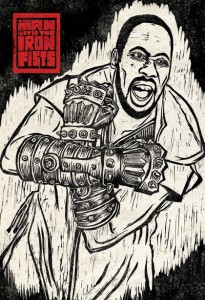 Renn: You talked a lot about the backdrop of your life, and the kung-fu and everything. So, when you’re taking on the challenge of making a martial arts film, what was your thought process on balancing kind of fitting into that tradition and then also, you know, blowing it up and doing something that’s never been done?
Renn: You talked a lot about the backdrop of your life, and the kung-fu and everything. So, when you’re taking on the challenge of making a martial arts film, what was your thought process on balancing kind of fitting into that tradition and then also, you know, blowing it up and doing something that’s never been done?
RZA: One thing I tried to do was — the first thing I should aim at is making a good film. Having an interesting story that, if it wasn’t martial art and you just had to watch the story of these people, would they interest you? That was the first thing. Second thing was to make sure that the martial art wasn’t fatiguing. I do have a lot of action in this film. Actually, more than the average martial art film. My action choreographer tried to talk me out of it. He’s like: “All you need is opening scene, middle, and end.” I said, “Nah, not in this movie, buddy.” But make a good film first was the aim here. And secondly, being that it was an imagination, it had to have something good to look at. You know, when you look at hip-hop, sometimes the sound is off and you just see the video. The girl’s booty is moving and the big wide mountain shots they do sometimes. So, cinematography is important. So, I thought of that as well. So I wanted people to be able to just, if you don’t hear anything or see anything, you just turn it on and look it at, it still has a visually stunning effect. I think the trailer shows that. When people see the trailer, it’s like: “It looks nice.” So that was important too. I also want to give some credit to my DP. I have a DP named Chi Ying Chan. Just call him Yin basically. But he did a movie called Detective Dee and the Mystery of the Phantom Flame, which was the number one movie in China when I was scouting.
Renn: Wow
RZA: I was fortunate enough to get this guy. He had just come off a big movie and he come onboard; and the reason why he came onboard is because the universe was on my side for this movie. I met him about ten to twelve years ago, working on a video called Tragedy for a video I did, which was a kung-fu one. And he was the DP twelve years ago, and he blew up to be one of the top DPs in the country. And was like: “RZA.” Through emails, “I knew you, it’s me!.” I said, “Oh shit, wow. You just did Detective?” And I went to the movie theater and watched Detective Dee. It was in the theaters at the time. And I was like: “This looks incredible.” My buddy’s made it. Like I made it to a director. He made it to be a top DP. And boom, we came together, and I think we got something great here.
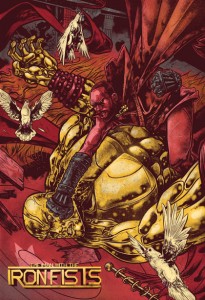 Q: Tell me about the practice of martial art and how that informed your work as a director. It’s interesting. I had a really interesting conversation with Pam Greer about how martial arts informs her acting. So, I’d be interested to hear.
Q: Tell me about the practice of martial art and how that informed your work as a director. It’s interesting. I had a really interesting conversation with Pam Greer about how martial arts informs her acting. So, I’d be interested to hear.
RZA: Well, martial arts actually informs my every day life. you know what I mean? So, it goes in almost everything I do. I think I live by the martial principles more than it forms of martial art. As a director, you know, remaining calm. Actually, the DP said I was the most calm director he worked with in twenty years. And yet, everybody did what I said. They worked to please me and I didn’t have a bullhorn. You know what I mean? Even in China, they always have bullhorns, so he was impressed. It’s because of the calmness of the spirit that martial arts teaches me, and I’m able to calm myself and absorb a tremendous amount of stress. Kung Fu used to be able to absorb a tremendous punch, but a punch doesn’t have to be physical. A punch – if I could say: ” “You Stupid mother fucker,” that’s a punch too. That’s something you might want to respond to. You know what I mean? So, I’m able to absorb a tremendous amount of stress because of my martial mentality. And I think also it helped me communicate to other people. I have a DP. I have a production designer named Drew Boughton, who had just came off of working with Pirates. And he also did a movie with Tony Scott. Rest in peace, Tony. And also, when he came onboard, said, “Your style of doing things is just” — it made him comfortable to go extra. I’m able to dig an extra morsel out of his mind. Like: “Hold on, no. Oh, wait a minute.” [grabs book on the table] This martial art principle, which is no, this is a martial book right here. You know what I mean? The Book of the Five Rings is a martial book. You know what I mean? You got that one as well?
Speaker 1: No, I don’t.
RZA: It’s a great one. I suggest that one to you. Beautiful. Beautiful. But anyway, this way – I’m a martial art thinker. You know what I mean? Now, I did have a trainer on set while we did the movie, who was Gordon Liu’s big brother. There’s a famous director named Lau Kar-leung. Do you guys know this guy? He directed 36 Chambers. He directed most of those early Gordon Liu movies. His classmate was my Hung Ga, Tiger Style instructor for the movie.
Speaker 1: Nice.
RZA: That was incredible. He was talking shit too. He was like: “You could beat Gordon.” I was like: “I won’t say that. I love Gordon.” The tiger’s good. Anyway. Thanks guys.